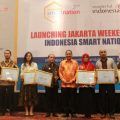Vaccine or not, we have to come to terms with the reality that COVID-19 requires us to rethink how we live. And that includes the idea of smart cities that use advanced technologies to serve citizens. This has become critical in a time of pandemics. Smart city solutions have already proved handy for curbing the contagion. Examples include:
- remote temperature monitoring systems
- real-time heatmaps of crowding in public spaces
- drones spraying disinfectants
- robots acting as “safe-distance ambassadors”.
Issues of trust are central
In a world of egalitarian governments and ethical corporations, the solution to a coronavirus-like pandemic would be simple: a complete individual-level track and trace system. It would use geolocation data and CCTV image recognition, complemented by remote biometric sensors. While some such governments and corporations do exist, putting so much information in the hands of a few, without airtight privacy controls, could lay the foundations of an Orwellian world.
This is not a trivial challenge. Desired behaviors that maximize societal benefit may not align with individual preferences in the short run. In part, this could be due to misplaced beliefs or misunderstanding of the long-term consequences.
As an example, despite the rapid spread of COVID-19 in the US, many states have had public protests against lockdowns. A serious proportion of polled Americans believe this pandemic is a hoax, or that its threat is being exaggerated for political reasons.
Design systems that build trust
The first step in modifying people’s behavior to align with the greater good is to design a system that builds trust between the citizens and the city. Providing citizens with timely and credible information about important issues and busting falsehoods goes a long way in creating trust. It helps people to understand which behaviors are safe and acceptable, and why this is for the benefit of society and their own long-term interest.
In Singapore, the government has very effectively used social media platforms like WhatsApp, Facebook, Twitter, Instagram, and Telegram to regularly share COVID-19 information with citizens.
Densely populated cities in countries like India face extra challenges due to vast disparities in education and the many languages used. Smart city initiatives have emerged there to seamlessly provide citizens with information in their local language via a smartphone app. These include an AI-based myth-busting chatbot.
Guard against misuse of data
Effective smart city solutions require citizens to volunteer data. For example, keeping citizens updated with real-time information about crowding in a public space depends on collecting individual location data in that space.
Individual-level data is also useful to coordinate responses during emergencies. Contact tracing, for instance, has emerged as an essential tool in slowing the contagion.
Technology-based smart city initiatives can enable the collection, analysis, and reporting of such data. But misuse of data erodes trust, which dissuades citizens from voluntarily sharing their data.
It is also important to create robust data governance policies. These can help foster trust and encourage the voluntary sharing of data by citizens.
Using several case studies, the consulting firm PwC has proposed a seven-layer framework for data governance. It describes balancing privacy concerns of citizens and efficacy of smart city initiatives as the “key to realizing smart city potential”.
As we emerge from this pandemic, we will need to think carefully about the data governance policies we should implement. It’s important for city officials to learn from early adopters.
While these important issues coming out of smart city design involve our behavior as citizens, modifying behavior isn’t enough in itself. Civic leaders also need to rethink the design of our city systems to support citizens in areas like public transport, emergency response, recreational facilities, and so on. Active collaboration between city planners, tech firms, and citizens will be crucial in orchestrating our future cities and hence our lives.
author: Diva Maharani | Illustrator: Akbar Nugroho
source:
- https://www.pwc.com/us/en/industries/capital-projects-infrastructure/library/foundation-of-smart-city-success.html
- https://www.technologyreview.com/2020/05/07/1000961/launching-mittr-covid-tracing-tracker/
- https://www.edexlive.com/happening/2020/may/09/why-this-myth-and-fake-news-buster-app-by-iiit-delhi-profs-is-the-coolest-thing-in-this-covid-19-wor-11890.html
- https://www.mci.gov.sg/pressroom/news-and-stories/pressroom/2020/4/gov-sg-launches-new-channels-to-keep-the-public-informed-about-covid-19
- https://pubsonline.informs.org/doi/10.1287/msom.2019.0823
- https://www.smartcitiesworld.net/news/news/covid-19-accelerates-the-adoption-of-smart-city-tech-to-build-resilience--5259
- https://www.weforum.org/agenda/2020/03/three-ways-china-is-using-drones-to-fight-coronavirus/
- https://www.smartcitiesworld.net/news/news/singapore-pilots-robot-dog-to-assist-safe-distancing-in-parks-5266
- https://www.channelnewsasia.com/news/world/covid19-coronavirus-who-go-away-12729420





